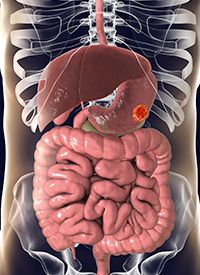News
Article
Trastuzumab Deruxtecan Demonstrates Promising Clinical Activity in Heavily Pretreated HER2-Low Gastric/GEJ Adenocarcinoma
Author(s):
Fam-trastuzumab deruxtecan-nxki induced tumor reduction in more than 60% of patients with HER2-low gastric or gastroesophageal junction adenocarcinoma.

Fam-trastuzumab deruxtecan-nxki (Enhertu) induced tumor reduction in more than 60% of patients with HER2-low gastric or gastroesophageal junction (GEJ) adenocarcinoma, according to results from 2 exploratory cohorts of the DESTINY-Gastric01 trial (NCT03329690).
From February 2018 to February 2019, 21 immunohistochemistry (IHC) 2-positive/ in situ hybridization-positive (ISH)-negative patients enrolled in cohort 1 of the study. Twenty-four IHC-positive patients enrolled in cohort 2. Twenty (95.2%) patients in cohort 1 and 24 (100%) patients in cohort 2 received trastuzumab deruxtecan.
Independent central review (ICR) confirmed an objective response rate (ORR) of 26.3% (95% CI, 9.1%-51.2%) in patients receiving trastuzumab deruxtecan in cohort 1 and 9.5% (95% CI, 1.2%-30.4%) in cohort 2. There were no complete responses in either group. The unconfirmed ORR was 36.8% (95% CI, 16.3%-61.6%) in cohort 1 and 19.0% (95% CI, 5.4-41.9) in cohort 2.
The confirmed ORR by investigator assessment was 42.1% in cohort 1 and 14.3% in cohort 2. As assessed by ICR, 68.4% of patients in cohort 1 and 60% of patients in cohort 2 had reductions in tumor size. Those totals include 3 patients in cohort 1 and 2 in cohort 2 who previously received irinotecan.
DESTINY-Gastric01 was a multicenter, open-label, 3-cohort phase 2 trial of trastuzumab deruxtecan in patients from Japan and South Korea with HER2-expressing advanced gastric/GEJ adenocarcinoma that progressed after at least 2 previous therapies.
Eligible patients were 20 years or older with pathologically documented locally advanced or metastatic gastric/GEJ adenocarcinoma, had measurable disease based on RECIST v1.1, and had Eastern Cooperate Oncology Group (ECOG) performance status (PS) scores of 0 or 1.
Patients had tumors that progressed during or after treatment with at least 2 previous therapies including fluoropyrimidine and platinum-containing regimens. Patients were excluded if ILD or pneumonitis was present or suspected, or if they had a history of noninfectious ILD/pneumonitis treated with glucocorticoids.
Patients in the exploratory cohorts had HER2-low gastric/GEJ adenocarcinoma confirmed by central laboratory testing and had not received anti-HER2 therapy. All patients received 6.4 mg/kg of intravenous trastuzumab deruxtecan once every 3 weeks, as determined by previous pharmacokinetic, efficacy, and safety data, until occurrence of disease progression, withdrawal of consent, or unacceptable adverse events.
At the November 8, 2019, data cutoff, no patients in cohort 1 and two patients in cohort 2 remained on treatment. The most common reason for discontinuation was disease progression (cohort 1: 80%; cohort 2: 79.2%).
The median treatment duration was 4.2 months (range, 1.3‐10.5) in cohort 1 and 2.8 months (range, 0.7-14.9) in cohort 2. The full analysis and safety sets included 20 patients in cohort 1 and 24 patients in cohort 2. The response evaluable set included 19 and 21 patients, respectively.
The disease control rate was 89.5% in cohort 1 and 71.4% in cohort 2. The median duration of response in patients with confirmed ORR was 7.6 months (95% CI, 4.1-not evaluable [NE]) in cohort 1 and 12.5 (NE-NE) months in cohort 2 on the basis of Kaplan-Meier estimates.
The median overall survival was 7.8 months (95% CI, 4.7-NE) in cohort 1 and 8.5 months (95% CI, 4.3 to 10.9) in cohort 2. The median progression-free survival by ICR was 4.4 months (95% CI, 2.7-7.1) in cohort 1 and 2.8 months (95% CI, 1.5-4.3) in cohort 2.
Investigators concluded that time to treatment failure, change in tumor size over time, and time to deterioration of ECOG performance score to 2 or greater were numerically better in cohort 1 than in cohort 2. However, investigators did not perform a statistical comparison between the 2 groups.
Seventy percent of patients in cohort 1 and 79.2% in cohort 2 experienced grade 3 or higher treatment emergent adverse events (TEAEs). Thirty percent of patients in cohort 1 experienced serious TEAEs and 55.0% had drug-related serious TEAEs of grade 3 or higher. In cohort 2, 45.8% of patients had serious TEAEs and 25.0% had drug-related serious TEAEs of grade 3 or higher.
In previous findings from the DESTINY-Gastric01 intent-to-treat population, trastuzumab deruxtecan induced an ORR of 51.3% (95% CI, 41.9%-60.5%) vs 14.3% (95% CI, 6.4%-26.2%) with irinotecan or paclitaxel. The confirmed ORR per ICR was 42.0% (95% CI, 33.0%-51.4%) vs 12.5% (95% CI, 5.2%-24.1%), respectively. Additionally, the median OS was 12.5 months (95% CI, 10.3-15.2) with trastuzumab deruxtecan vs 8.9 months (95% CI, 6.4-10.4) with chemotherapy (HR, 0.60; 95% CI, 0.42-0.86, P = .01).
In January 2021, the FDA has approved fam-trastuzumab deruxtecan-nxki for the treatment of adult patients with locally advanced or metastatic HER2-positive gastric or GEJ adenocarcinoma who have received a previous trastuzumab (Herceptin)-based regimen.2 The decision was based on the earlier DESTINY-Gastric01 findings.
References
- Yamaguchi K, Bang YJ, Iwasa S, et al. Trastuzumab deruxtecan in anti-human epidermal growth factor receptor 2 treatment-naive patients with human epidermal growth factor receptor 2-low gastric or gastroesophageal junction adenocarcinoma: exploratory cohort results in a phase II trial. J Clin Oncol. Published online November 15, 2022. doi:10.1200/JCO.22.00575
- FDA approves fam-trastuzumab deruxtecan-nxki for HER2-positive gastric adenocarcinomas. News release. FDA. January 15, 2021. Accessed January 15, 2021. http://bit.ly/35KBZ8T.









